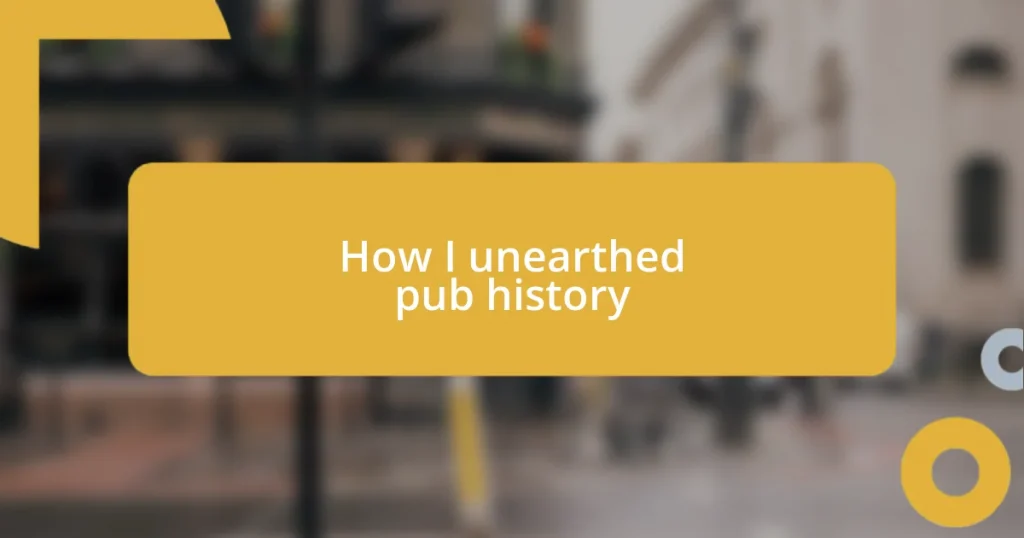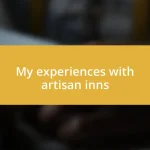Key takeaways:
- Pub history research uncovers unique narratives that highlight the connection between establishments and their communities, enriching the understanding of local culture.
- Key resources for research include local archives, online databases, and interactions with local historians, which provide invaluable insights and firsthand accounts.
- Engaging with historical societies and utilizing digital tools enhances exploration, allowing discovery of hidden stories and transformation of visits into meaningful connections with the past.
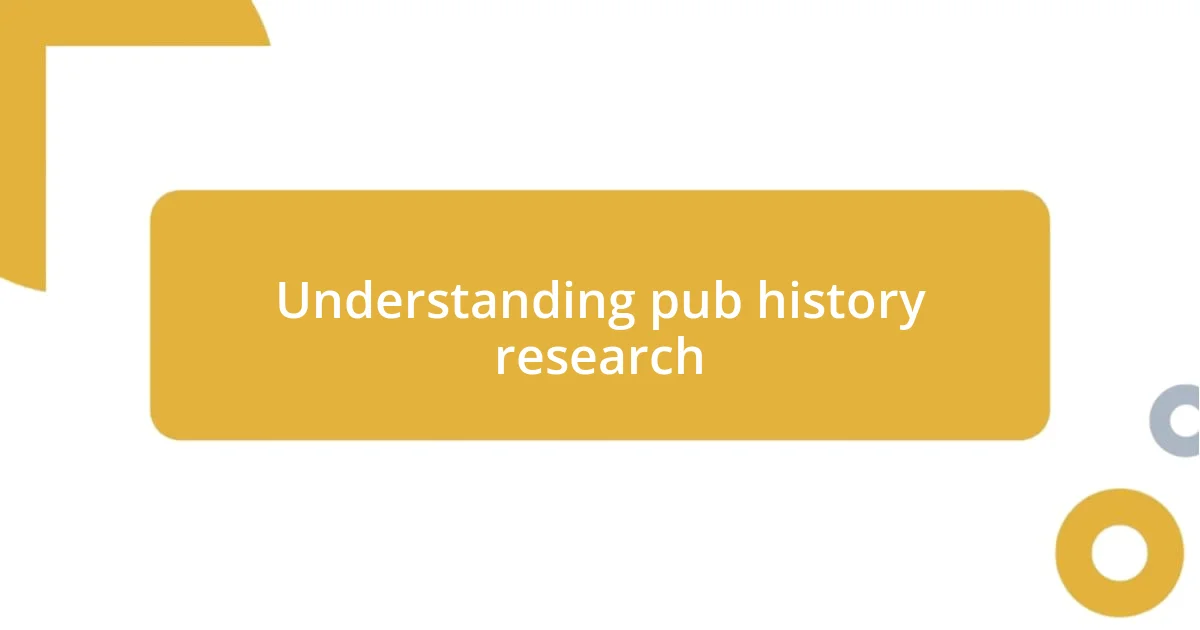
Understanding pub history research
When I first dove into pub history research, I was amazed at how many stories lie hidden in the bricks and mortar of these establishments. Each pub has a unique narrative intertwined with its community, and I found myself pondering — what secrets would the walls reveal if they could talk? Through local records, old photos, and personal testimonies, I began to piece together the rich tapestry that forms the backdrop of my favorite watering holes.
I vividly remember uncovering a newspaper article from the 1800s about a local tavern’s role in community gatherings. I could feel the excitement of those moments, imagining the lively debates and laughter ringing through the air. It struck me how researching pub history is not just about facts and dates; it’s about understanding the heartbeat of a community and the people who frequented these spaces. Each discovery felt like unearthing a part of a shared past, igniting a curiosity that only deepened with each revelation.
Engaging with the history of pubs has also meant bridging the past with the present. I often reflect on how many modern-day patrons stroll through those doors without realizing they’re stepping into history. Isn’t it fascinating to think that as we enjoy a pint, we’re participating in a tradition that has evolved over centuries? My journey in pub history research has taught me that every visit is an opportunity to explore, connect, and appreciate the stories waiting to be told.
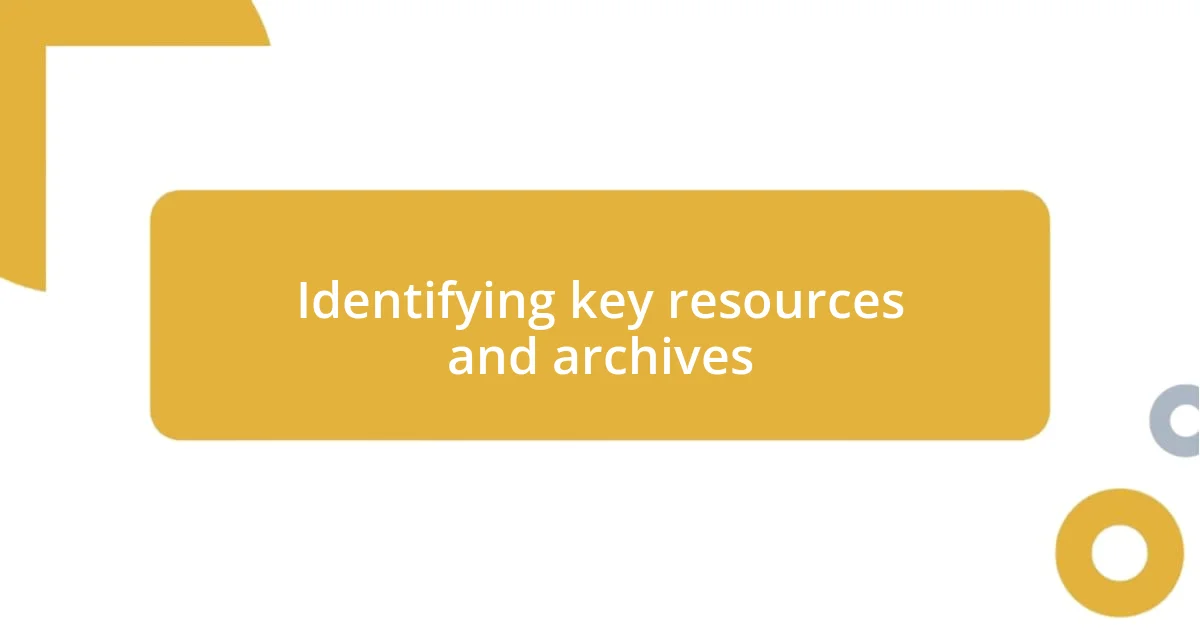
Identifying key resources and archives
Identifying key resources and archives can feel overwhelming at first, but I’ve discovered that some gems make the journey easier. Local archives, such as city council records and library collections, hold a treasure trove of documents you might never have considered. While exploring my town’s archive, I stumbled upon old licensing records for pubs, revealing not just their history but also the evolving nature of the community itself over decades.
One of my favorite resources turned out to be online databases, which provide access to digitized newspapers and historical documents. I can still recall the thrill of scrolling through pages of old newspapers, locating a small mention that detailed the grand opening of a pub that had long since closed its doors. It felt like connecting with history firsthand. This modern convenience opens up a world that previous researchers would have envied.
Don’t underestimate the power of local historians and pub enthusiasts, either. They often have invaluable insights and unpublished materials. I remember attending a community meeting where a local elder shared fascinating anecdotes about a pub’s role during wartime, which deepened my appreciation for its significance. These interactions can provide context that you won’t find in the archives, transforming a simple documentary research project into a living narrative.
| Resource Type | Description |
|---|---|
| Local Archives | City council records and library collections containing documents related to pubs |
| Online Databases | Access to digitized newspapers and historical documents providing context and narratives |
| Local Historians | Individuals knowledgeable about pub history, often holding unpublished materials and anecdotes |
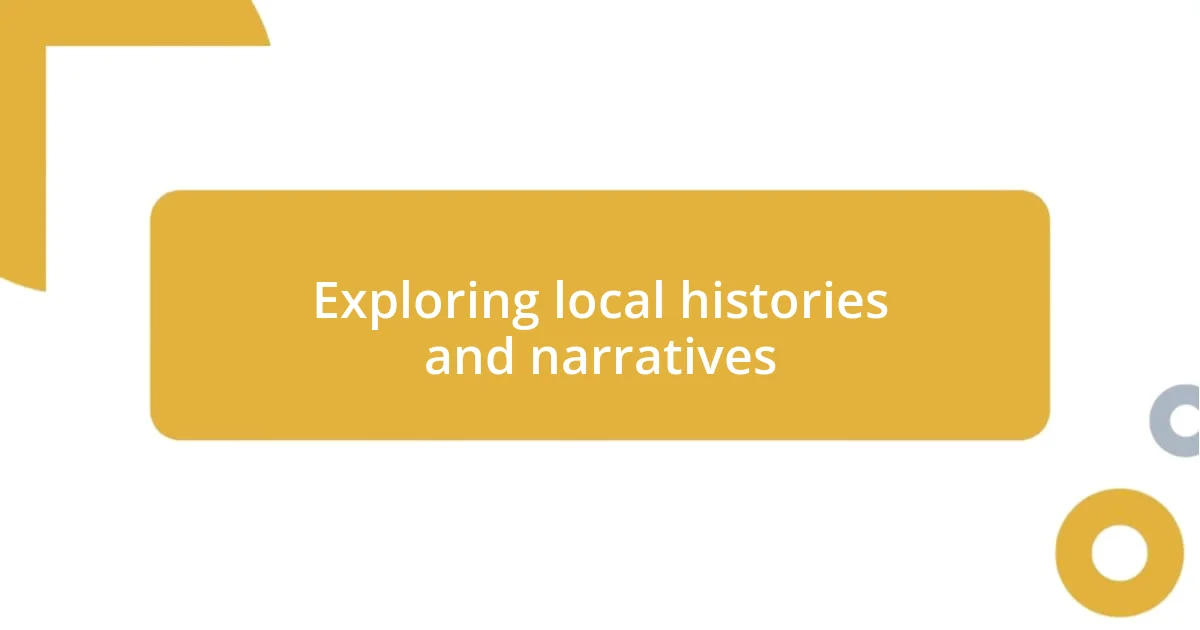
Exploring local histories and narratives
Exploring local histories offers a unique lens through which to view the past. I remember a compelling moment when I visited an old pub in my neighborhood, feeling its age in the creaky floorboards. As I chatted with the bartender, I learned it once hosted clandestine meetings during a significant local movement. These conversations often reveal deeper stories, transforming a simple visit into a personal connection to history.
- I discovered old photos of the pub’s original owners, paired with handwritten notes documenting their ambitions and struggles.
- Visiting local history societies has connected me with individuals who remember the days when pubs served as community hubs for celebrations and farewells.
- Participating in pub quizzes led me to discover trivia about historical events tied to the venue, creating a rich backdrop for the laughs and competition.
Through these exchanges, I’ve come to appreciate how local narratives breathe life into the history of our pubs, making each visit more than just a drink but a communion with the past.
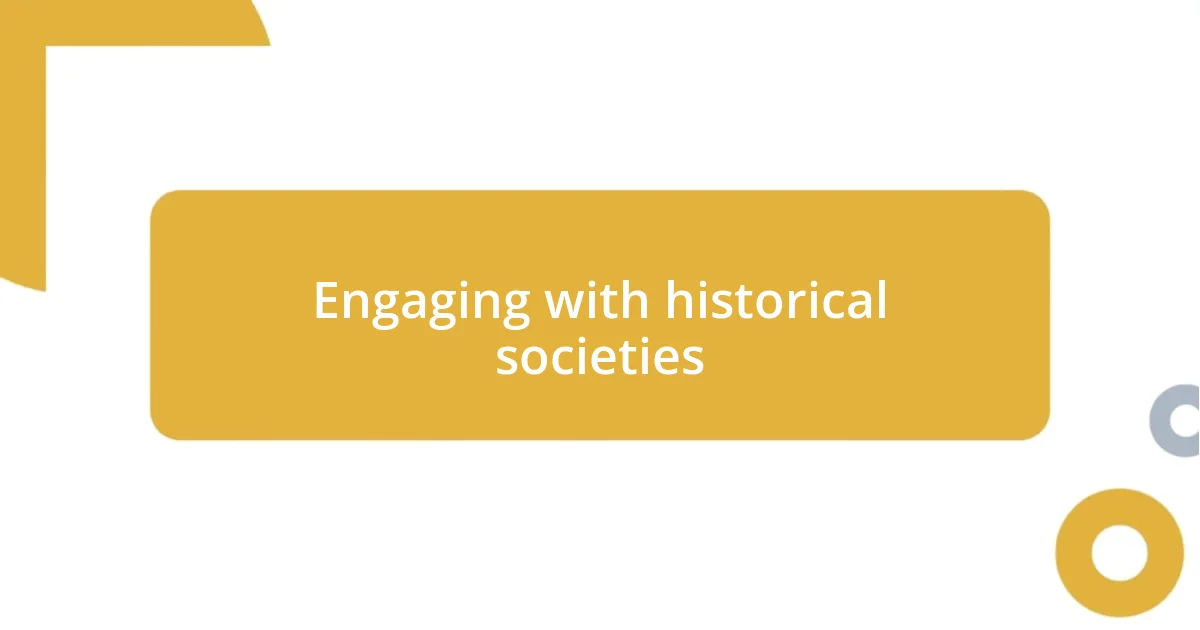
Engaging with historical societies
I’ve found that engaging with historical societies can be a rewarding way to deepen my understanding of pub history. At one of their meetings, I met a member who had meticulously collected stories about different establishments throughout our area. Listening to him recount how a local pub became a safe haven during a crisis really struck me. Isn’t it fascinating how a simple building can serve as a backdrop for pivotal moments in a community’s life?
One memorable encounter occurred when I volunteered for a historical society event. As I helped set up an exhibition, I was approached by an elderly woman who shared her memories of a pub where she celebrated her 21st birthday. Her eyes sparkled with nostalgia, and I could almost feel the warmth of that gathering, as if the years melted away. These anecdotes enrich the history I uncover, reminding me that every pub has its own life and culture wrapped around it.
I also encourage you to take advantage of their resources. Many societies have archives filled not just with documents, but also with oral histories that capture the voices of those who lived through significant events. Engaging with these societies allows us to connect with the very heartbeat of our towns, bridging the past and present in a way that feels both intimate and enlightening. How often do we truly pause to appreciate the stories woven into our surroundings?
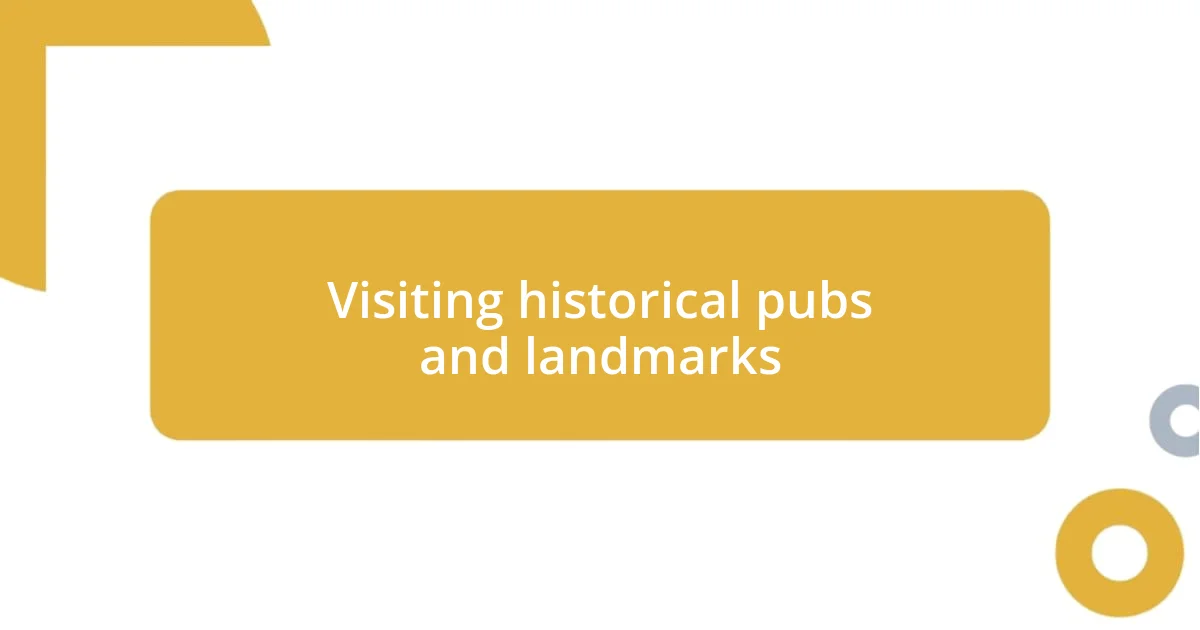
Visiting historical pubs and landmarks
During my wanderings through old towns, stumbling upon historical pubs feels like unearthing hidden treasures. I recall the excitement when I entered a pub that dated back to the 17th century. The smell of aged wood and old beer wafted through the air, wrapping around me like a warm blanket. As I sipped my drink, the bartender shared that it once hosted famous poets and playwrights, sparking my imagination about what conversations had taken place within those walls. Can you picture the lively discussions that shaped such creative minds?
Visiting these pubs often leads me to fascinating landmarks just around the corner. One afternoon, after a delightful lunch at a locally cherished tavern, I ambled over to a nearby historic site. It was here that major decisions were made during the town’s formation. Standing there, I felt the weight of history; it was as if the very ground held whispers of the past. I couldn’t help but wonder how many patrons had gathered in that same tavern, discussing their dreams and plans for the future.
Every visit becomes a story of its own. I’ll never forget the time I unearthed a hidden garden behind a pub, adorned with remnants of centuries-old brewing equipment. It felt like stepping into a time capsule where every scrap of rust told a tale. It made me reflect on how much history is tucked away, just waiting for someone to notice. Isn’t it incredible how our local pubs hold pieces of time that connect us all?
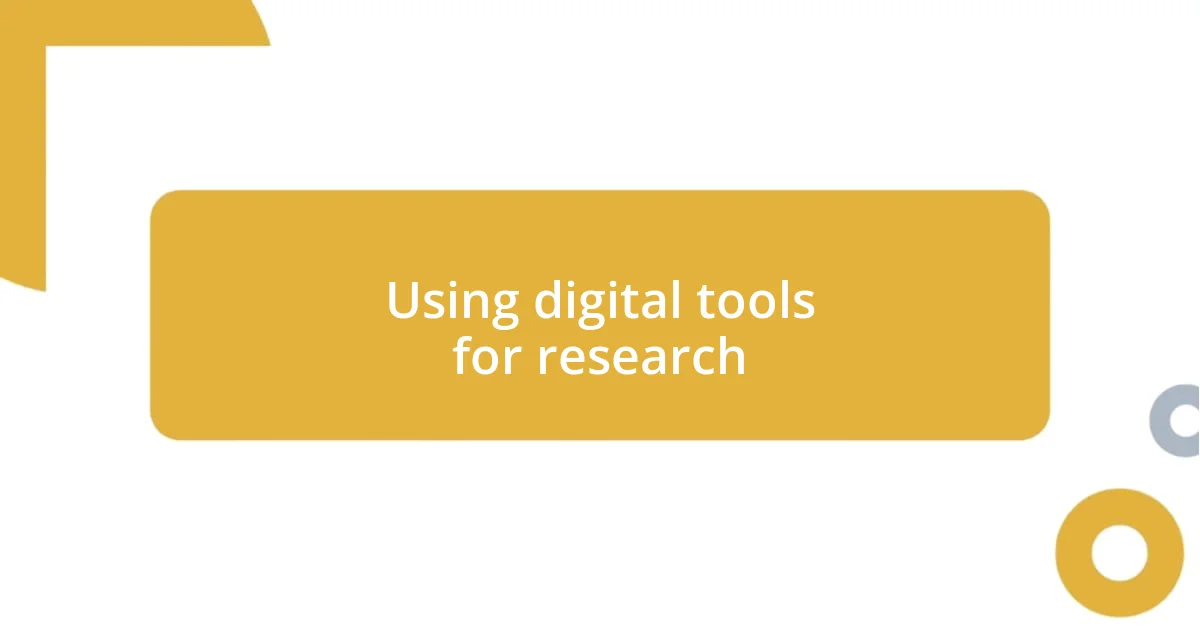
Using digital tools for research
Using digital tools for research has transformed the way I approach pub history. I often dive into online databases, where archival photos and historical records are just a click away. It’s like having a treasure chest filled with jewels right at my fingertips. With just a few searches, I’ve stumbled upon obscure facts about local pubs that reignited my excitement for discovery.
One of my favorites has been using social media to connect with fellow enthusiasts and historians. I’ve joined groups where members share rare documents and personal anecdotes about their local watering holes. Not long ago, I saw a post featuring an old advertisement for a pub that had long been closed. It led me down a rabbit hole of researching its ownership and old events. Who knew a simple post could kickstart a deeper exploration into the community’s history?
Additionally, I’ve relied heavily on mapping tools to visualize historical changes in pub locations. By layering old maps over current ones, I can pinpoint where establishments once thrived. It’s astonishing to realize how many pubs have stood the test of time, while others have vanished, leaving only whispers of their existence. Have you ever considered how these visual connections can enhance your understanding of the evolution of local culture? For me, it’s like piecing together a puzzle where every piece tells a story waiting to be discovered.










